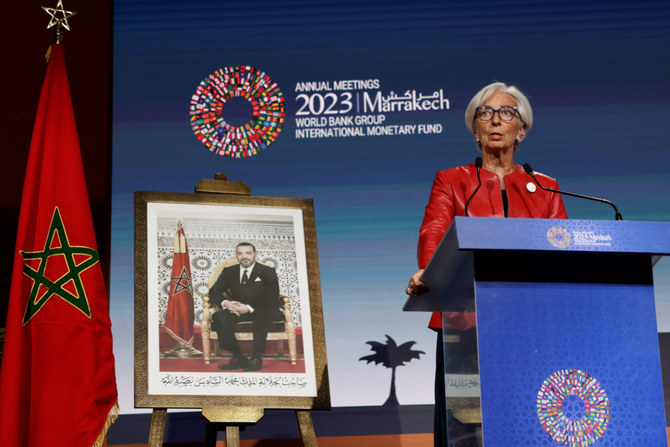IMF-World Bank assemblies in Marrakech focus on responses to global shocks

https://arab.news/nc3hk
Libya’s terrible flood and Morocco’s devastating earthquake weeks before the annual assemblies of the World Bank and the International Monetary Fund were a timely and necessary warning to policymakers. Given the exposure of developing countries to global shocks, Africa’s hosting of the annual meetings for the first time in 50 years was an important moment. For Marrakech specifically, so soon after recent events, it was historic.
These parallel crises clearly set the scene for the cooperation that is needed and required from developed countries and international financial institutions to make resources available to governments in need. Most urgent is supporting the frontline countries risking debt default.
In the Global South, some 64 percent of countries are critically or very critically indebted. In fact, Ghana and Sri Lanka defaulted on their external debt in 2022, while Pakistan and Egypt are on the verge of a default. Though some countries have secured short-term debt relief, it is more urgent that solutions are found that extend beyond bailouts.
Furthermore, the IMF and World Bank served as a platform to foster a global solution to these natural disasters. With climate change intensifying the frequency and impact of these events, it is imperative to establish international frameworks that coordinate disaster response efforts. The creation of a dedicated fund, supported by contributions from economically stable nations, could provide rapid and targeted assistance to countries affected by natural disasters. This remaining outstanding is reflective of the scale of challenges the world faces and will continue to face as such disasters happen with more regularity.
Moreover, collaborative research and development initiatives focused on disaster-resistant infrastructure and early warning systems can enhance preparedness, minimizing the loss of life and economic damage caused by these events.
To truly relieve the burden, however, new creditors and systems of credit are necessary. These cannot be achieved without the participation of China and the private sector to offer debt restructuring and thereby avoid the debt crisis of the 1980s that scarred less-developed nations for two decades thereafter. Inflationary pressures and rising interest rates make this particularly important in instances where debt refinancing is required. Given that the “common framework” the G20 tried to establish three years ago to deal with this issue has failed, it is critical that over the coming months the IMF and World Bank work to achieve a more lasting solution.
The annual IMF and World Bank meetings are similarly pivotal in the global effort against climate change. The assemblies provide essential frameworks for influential leaders to address this urgent issue. In today’s world, a robust financial system, supported by institutions like the IMF and World Bank, is paramount. Looking forward to the spring meetings, decision-makers will have to build upon the momentum of what was discussed in Marrakech.
Climate change necessitates global cooperation. Unity is vital in confronting this pressing challenge.
Zaid M. Belbagi
Climate change mitigation and prevention demand trillions of dollars, a point underscored during these meetings, to help both developed and developing nations combat its effects. The critical role of organizations such as the World Bank and IMF in organizing funds and policies cannot be overlooked.
Developing nations, often lacking resources and infrastructure to cope with these shocks too often bear the brunt of its impact. Support from institutions like the IMF and World Bank is indispensable. Neglecting these nations during crises will worsen these global challenges.
Climate change necessitates global cooperation. Unity is vital in confronting this pressing challenge. IMF Managing Director Kristalina Georgieva emphasized this in her speech in Marrakech : “A prosperous world economy in the 21st century requires a prosperous Africa.”
Finding global solutions to global challenges is critical. The recent summit for a New Global Financing Pact held hosted by French President Emmanuel Macron, emphasized the urgent need for a comprehensive international financial structure. This structure is vital for mobilizing funds to combat climate change.
In the absence of this, the World Bank is essential, however, it has faced criticism about its funding. Many arguing that it can contribute more. The current meetings are rightly focusing on pressuring the World Bank to significantly increase its spending of approximately $216 billion, aligning with the monumental tasks at hand.
As its president said in Marrakech: “There may be a day where we need to commit 60 percent of our funding to Africa” — such are the challenges the continent faces.
• Zaid M. Belbagi is a political commentator and an adviser to private clients between London and the GCC. X: @Moulay_Zaid









































